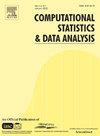Tobit模型中变量选择的分布式迭代硬阈值
IF 1.6
3区 数学
Q3 COMPUTER SCIENCE, INTERDISCIPLINARY APPLICATIONS
引用次数: 0
摘要
虽然有大量关于左删节响应的高维回归的研究,但很少有方法以分布式的方式解决这个问题。由于数据传输限制和隐私问题,集中所有数据通常是不切实际的,因此需要一种使用分布式数据进行协作学习的方法。在本文中,我们对Tobit模型采用迭代硬阈值(IHT)方法来解决这一挑战,允许人们直接指定所需的稀疏性,并提供替代估计和变量选择方法。理论分析表明,我们的估计器仅使用几轮通信就达到了接近最小最大最优收敛速率。在池化和分布式两种情况下对其实际性能进行了评价。与现有方法相比,前者突出了其具有竞争力的估计效率和变量选择性能,而后者则表明分散估计器的性能与集中式估计器的性能非常匹配。当应用于高维左删节HIV病毒载量数据时,我们的方法也显示出相当的性能。本文章由计算机程序翻译,如有差异,请以英文原文为准。
Distributed iterative hard thresholding for variable selection in Tobit models
While there is a substantial body of research on high-dimensional regression with left-censored responses, few methods address this problem in a distributed manner. Due to data transmission limitations and privacy concerns, centralizing all data is often impractical, necessitating a method for collaborative learning with distributed data. In this paper, we employ the Iterative Hard Thresholding (IHT) method for the Tobit model to address this challenge, allowing one to directly specify the desired sparsity and offering an alternative estimation and variable selection approach. Theoretical analysis shows that our estimator achieves a nearly minimax-optimal convergence rate using only a few rounds of communication. Its practical performance is evaluated under both the pooled and the distributed setting. The former highlights its competitive estimation efficiency and variable selection performance compared to existing approaches, while the latter demonstrates that the decentralized estimator closely matches the performance of its centralized counterpart. When applied to high-dimensional left-censored HIV viral load data, our method also demonstrates comparable performance.
求助全文
通过发布文献求助,成功后即可免费获取论文全文。
去求助
来源期刊

Computational Statistics & Data Analysis
数学-计算机:跨学科应用
CiteScore
3.70
自引率
5.60%
发文量
167
审稿时长
60 days
期刊介绍:
Computational Statistics and Data Analysis (CSDA), an Official Publication of the network Computational and Methodological Statistics (CMStatistics) and of the International Association for Statistical Computing (IASC), is an international journal dedicated to the dissemination of methodological research and applications in the areas of computational statistics and data analysis. The journal consists of four refereed sections which are divided into the following subject areas:
I) Computational Statistics - Manuscripts dealing with: 1) the explicit impact of computers on statistical methodology (e.g., Bayesian computing, bioinformatics,computer graphics, computer intensive inferential methods, data exploration, data mining, expert systems, heuristics, knowledge based systems, machine learning, neural networks, numerical and optimization methods, parallel computing, statistical databases, statistical systems), and 2) the development, evaluation and validation of statistical software and algorithms. Software and algorithms can be submitted with manuscripts and will be stored together with the online article.
II) Statistical Methodology for Data Analysis - Manuscripts dealing with novel and original data analytical strategies and methodologies applied in biostatistics (design and analytic methods for clinical trials, epidemiological studies, statistical genetics, or genetic/environmental interactions), chemometrics, classification, data exploration, density estimation, design of experiments, environmetrics, education, image analysis, marketing, model free data exploration, pattern recognition, psychometrics, statistical physics, image processing, robust procedures.
[...]
III) Special Applications - [...]
IV) Annals of Statistical Data Science [...]
 求助内容:
求助内容: 应助结果提醒方式:
应助结果提醒方式:


